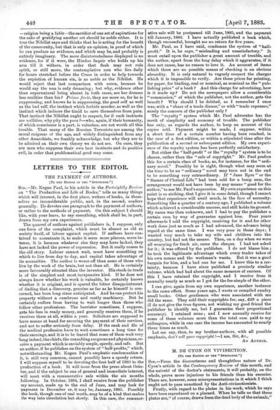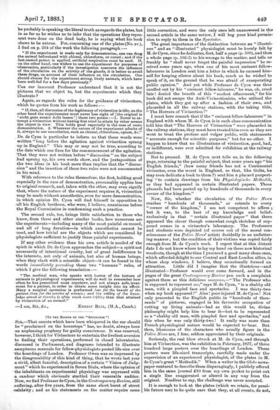M. DE CYON ON VIVISECTION. (To THE EDITOR OP THE
" SPECTATOE."] Sts,—From the discourteous and thoughtless nature of Dr. Cyon's article in the-Contemporary Review of this month, and the naivete of the doctor's statements, it will probably, on the whole, prove more injurious to his friends than his enemies. There are, however, some misrepresentations in it which I think ought not to pass unnoticed by the Anti-vivisectionists. Firstly, with regard to the plates in his work, which he says have been reproduced on a placard. When he tells us that these plates are," of course, drawn from the dead body of the animals,"
'he probably is speaking the literal truth as regards the plates, but in as far as he wishes us to infer that the operations they repre- .sent were done on the dead body, he is saying what his book _shows to be untrue. For, concerning one of the plates (No. xv.), I find on p. 264 of the work the following paragraph :—
" If the experiment is made only for demonstration, one can drug the animal beforehand with chloral, chloroform, or curari ; and if the last-named poison is applied, artificial respiration must be used. If, on the other hand, one wishes to use the experiment for purposes of -observation, particularly if the investigation concerns the influence of the circulation on the activity of the glands, it is better to avoid these drugs, on account of their influence on the circulation. One should choose for the experiment strong, lively animals, which have 'been well-fed for a few days previously."
'Can our innocent Professor understand that it is not the pictures that we object to, but the experiments which they illustrate ?
Again, as regards the rules for the guidance of vivisectors, which he quotes from his work as follows :-
" If, then, all discussion of the legitimacy of vivisection is idle, on the other hand the experimenter must never lose sight of [the original is nicht ganz onager Acht lassen 'j these two points :—I. Never to at- tempt a vivisection without having first tried to attain by other means the object in view. This holds good especially in the case of mere • demonstration. 2. Wherever the nature of the experiment admits of it, always to use anaesthetics, such, as chloral, chloroform, opium, drc."
Dr. de Cyon is particular to inform us that these words were written "long before the agitation against vivisection sprang up in England." This may or may not be true, according to the date which one fixes for the commencement of the agitation. That they were not written before " discussion " on the subject lad sprung up, his own words show, and the juxtaposition of the two ideas in his book more than implies that the " discus- .sion" and the insertion of these two rules were not unconnected in his mind.
With reference to the rules themselves, the first, holding good -especially in the case of demonstration, presumably applies less to original research, and, taken with the other, may even signify that, where the nature of the experiment requires it, vivisection may be made without anaesthetics, even for mere demonstration, in which opinion Dr. Cyon will find himself in opposition to all his English brethren, who were, I believe, unanimous before the Royal Commission in condemning such a practice.
The second rule, too, brings little satisfaction to those who 'know, from these and other similar books, how numerous are -the experiments—including many of the most painful on record, and all of long duration—in which anaesthetics cannot be nsed, and how trivial are the objects which are considered by physiologists sufficient to justify these painful experiments.
If any other evidence than his own article is needed of the -spirit in which Dr. de Cyon approaches the subject—a spirit not necessarily of intentional cruelty, but of great indifference to the interests, not only of animals, but also of human beings, -when they clash with a scientific object—it can be found in the -words immediately preceding these two " humane " roles, of which I give the following translation :—
" The medical man, who speaks with horror of the torture of -animals in physiological experiments, will do well to remember how -often be has prescribed most repulsive, and not always safe, treat- ment for a patient, in order to obtain some insight into its effect. Many a surgical operation is performed less for the benefit of the _patient than for the service of science; and the utility of the know- ledge aimed at thereby is often much more trifling than that attained 'by vivisection of an animal."



































 Previous page
Previous page